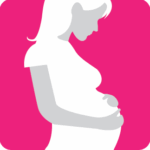

This leaflet is for pregnant women or women who have recently given birth who have been offered an iron infusion to correct their anaemia.
Iron deficiency anaemia is caused by lack of iron, often because of blood loss or pregnancy.
Anaemia in pregnancy and after giving birth is very common and is usually treated with oral tablets. The side effects of anaemia can be debilitating and may include excessive tiredness, lack of energy and shortness of breath. In pregnancy it is important to correct the iron levels to reduce the risk of complications, particularly at birth. Oral iron tablets should be continued until you have had your iron infusion unless otherwise advised by your doctor.
Ferinject is an injection which is used to treat iron deficiency and is given directly into a vein by a cannula using an intravenous drip. A cannula is a thin tube that is inserted into a vein using a small needle. This allows the bag containing the iron infusion to be attached to the cannula with a giving set tube to allow the medication to be given into the vein. Most women are offered two iron infusions of Ferinject which will be given at separate appointments.
Ferinject is considered when oral treatments have not been successful at increasing the iron levels in the blood or if you need a rapid increase in your iron levels. It may also be recommended if you are unable to tolerate oral iron due to its side effects.
You should not be given Ferinject® in the first 3 months of your pregnancy. However, it is safe to use in the rest of your pregnancy and after you have given birth.
It can cause problems with allergic reactions in less than 1 in every 100 cases. The most serious allergic reaction (anaphylaxis) is rare in less than 1 in every 1000 cases. You will be monitored closely during and after the treatment to make sure that if you have a reaction, it is managed safely.
Common side effects may include headache, dizziness, diarrhoea, rash, constipation, abnormal liver function, nausea and vomiting, flushing, abdominal pain, low or high blood pressure, muscle cramps, injection site reactions.
Discoloration or brown staining of the skin at the site of the cannula and surrounding tissues may occur in 1 in every 100 cases. If staining occurs there is a possibility that it will be permanent. This happens when the cannula is not working properly so it is important to tell the midwife if you have any pain or swelling at the infusion site.
Very little Ferinject crosses into breast milk so you can safely breast feed.
If you have any questions about Ferinject please speak to your doctor or midwife.
The iron infusion service usually takes place in the Antenatal Day Unit. To contact the Antenatal Day Unit call 01274 364531 Monday to Friday 08.00am until 5.00pm.
You can contact us using the Relay UK app. Textphone users will need to dial 18001 ahead of the number to be contacted.
Bradford Teaching Hospitals NHS Foundation Trust is a smoke-free organisation. You are not permitted to smoke or in use e-cigarettes in any of the hospital buildings or grounds.